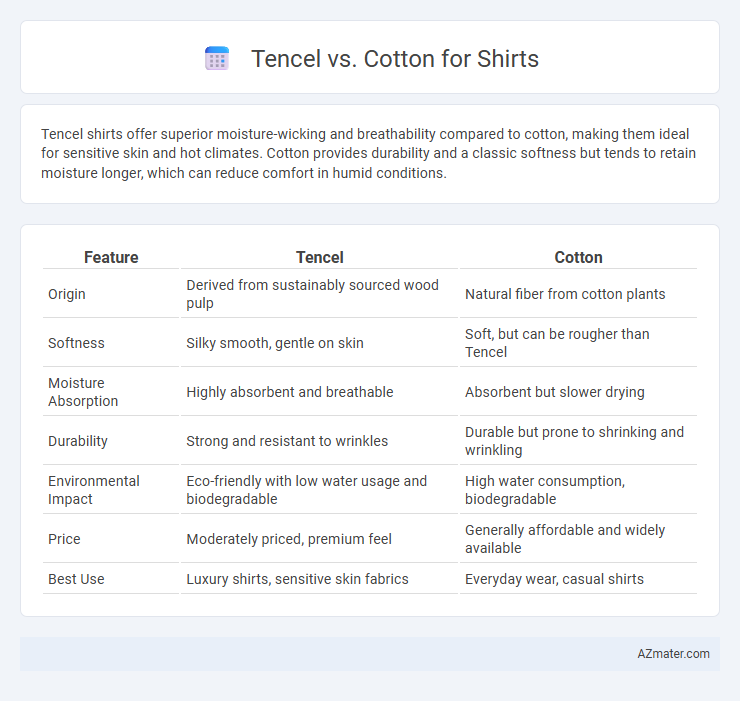Tencel shirts offer superior moisture-wicking and breathability compared to cotton, making them ideal for sensitive skin and hot climates. Cotton provides durability and a classic softness but tends to retain moisture longer, which can reduce comfort in humid conditions.
Table of Comparison
| Feature | Tencel | Cotton |
|---|---|---|
| Origin | Derived from sustainably sourced wood pulp | Natural fiber from cotton plants |
| Softness | Silky smooth, gentle on skin | Soft, but can be rougher than Tencel |
| Moisture Absorption | Highly absorbent and breathable | Absorbent but slower drying |
| Durability | Strong and resistant to wrinkles | Durable but prone to shrinking and wrinkling |
| Environmental Impact | Eco-friendly with low water usage and biodegradable | High water consumption, biodegradable |
| Price | Moderately priced, premium feel | Generally affordable and widely available |
| Best Use | Luxury shirts, sensitive skin fabrics | Everyday wear, casual shirts |
Introduction to Tencel and Cotton Shirts
Tencel shirts are crafted from lyocell fibers derived from sustainably sourced wood pulp, known for their exceptional softness, breathability, and eco-friendly production process. Cotton shirts, made from natural cotton fibers, are widely valued for their durability, moisture absorption, and versatility in various climate conditions. Both fabrics provide comfort and style, but Tencel offers superior moisture-wicking properties and a silky texture, while cotton remains a classic choice favored for its natural feel and easy care.
What is Tencel? Key Features
Tencel is a sustainable fabric made from wood pulp, primarily eucalyptus trees, processed through an eco-friendly closed-loop system that minimizes environmental impact. Its key features include exceptional breathability, moisture-wicking properties, and a silky soft texture that enhances comfort in shirts. Compared to cotton, Tencel offers superior durability, resistance to wrinkles, and natural antibacterial qualities, making it an ideal choice for performance and everyday wear.
Understanding Cotton: Properties and Types
Cotton, a natural fiber derived from the cotton plant, is prized for its softness, breathability, and moisture absorption, making it a popular choice for shirts. Various types of cotton, such as Egyptian, Pima, and Upland, differ in fiber length and quality, impacting durability, texture, and overall comfort. Understanding these cotton properties helps consumers select breathable, durable, and comfortable shirts suited to their preferences and climate conditions.
Comfort Comparison: Tencel vs Cotton
Tencel shirts provide superior moisture-wicking and breathability compared to cotton, making them ideal for all-day comfort and temperature regulation. Cotton, while soft and breathable, tends to retain moisture and can feel heavier when damp, impacting comfort during prolonged wear. The smooth, silky texture of Tencel reduces skin irritation, offering a more comfortable fit for sensitive skin relative to cotton's coarser fibers.
Breathability and Moisture Management
Tencel fibers excel in breathability and moisture management due to their natural ability to absorb moisture and release it quickly, keeping the skin dry and comfortable throughout the day. Cotton also offers good breathability but tends to retain moisture longer, which can lead to dampness and discomfort in hot or humid conditions. For shirts, Tencel provides superior moisture-wicking properties, making it ideal for active wear and warm climates where quick drying is essential.
Durability and Longevity
Tencel fibers exhibit superior durability compared to cotton due to their high tensile strength and resistance to wear, making Tencel shirts less prone to pilling and tearing over time. Cotton shirts, while comfortable and breathable, typically show faster signs of fabric degradation, especially with frequent washing and exposure to sunlight. Choosing Tencel ensures longer-lasting fabric integrity and sustained softness, enhancing shirt longevity in everyday use.
Sustainability and Eco-Friendliness
Tencel, produced from sustainably harvested eucalyptus trees through a closed-loop process, offers superior eco-friendliness compared to traditional cotton, which requires significant water and pesticide usage. Tencel fibers are biodegradable and generated with minimal chemical impact, making them a sustainable choice for environmentally conscious apparel. Cotton shirts, while natural, often have a larger carbon footprint due to intensive farming practices and water consumption.
Care, Maintenance, and Wrinkle Resistance
Tencel shirts require gentle washing with mild detergents and dry cleaning is often recommended to preserve fabric integrity, while cotton shirts are more durable, allowing machine washing and high-temperature drying. Tencel fibers have natural wrinkle resistance, reducing the need for frequent ironing compared to cotton, which tends to crease and requires regular pressing to maintain a neat appearance. The moisture-wicking and breathable qualities of Tencel contribute to easier maintenance and prolonged fabric life versus cotton, which can shrink or fade with improper care.
Price Differences: Tencel vs Cotton
Tencel fabrics typically cost more than cotton due to sustainable production methods and higher manufacturing expenses. Cotton shirts are generally more affordable and widely available, making them a popular choice for budget-conscious consumers. Price differences between Tencel and cotton reflect the environmental benefits and quality attributes of Tencel compared to the traditional nature of cotton.
Which Is Better for Shirts? Expert Recommendations
Tencel fibers offer superior moisture-wicking, breathability, and softness compared to traditional cotton, making them ideal for comfortable, lightweight shirts. Cotton remains a popular choice for its natural durability and ease of care, yet experts recommend Tencel for its eco-friendly production and enhanced drape that resists wrinkles. For shirts requiring high performance in terms of cooling and sustainability, Tencel is generally considered the better option by textile specialists.

Infographic: Tencel vs Cotton for Shirt
 azmater.com
azmater.com